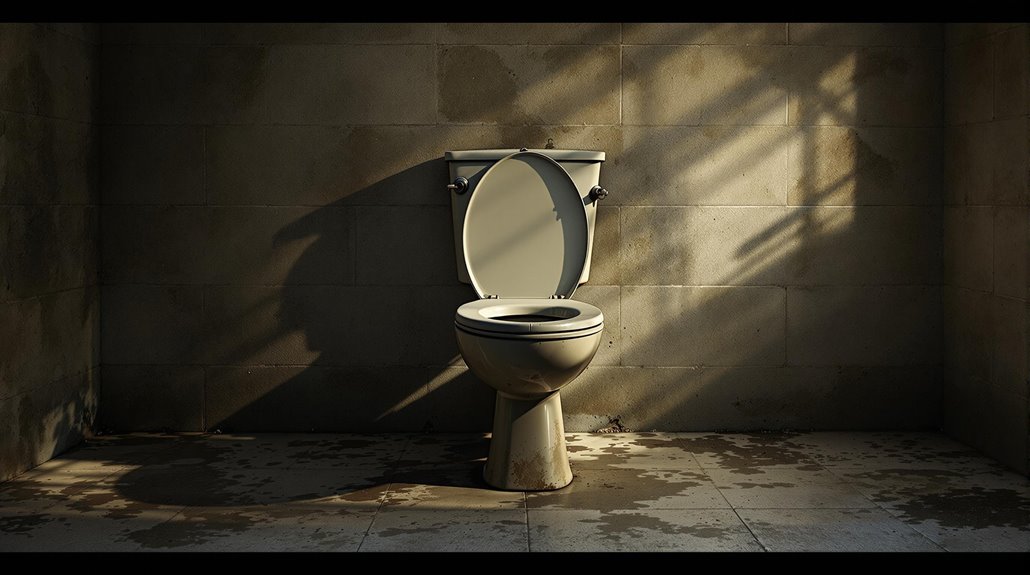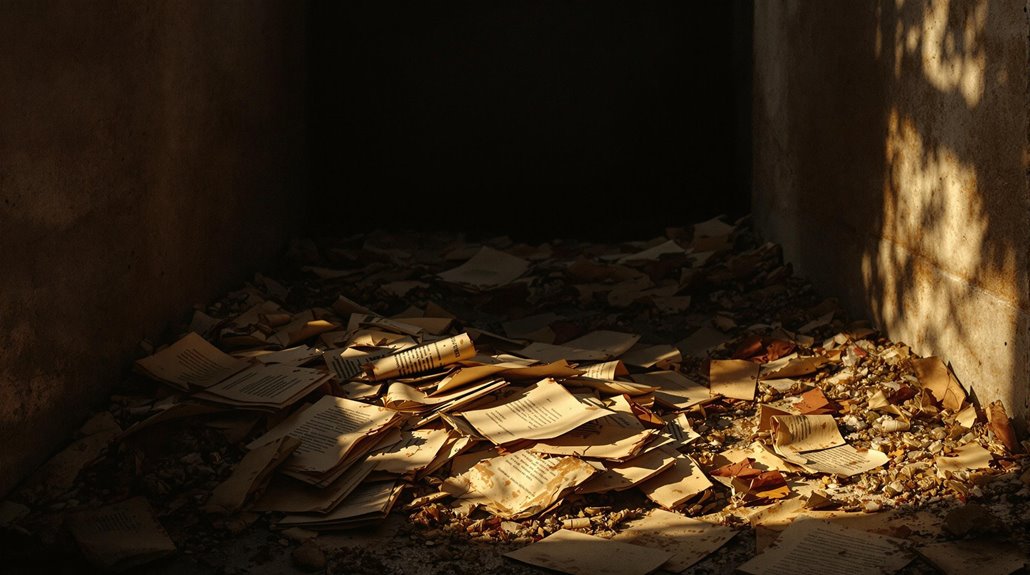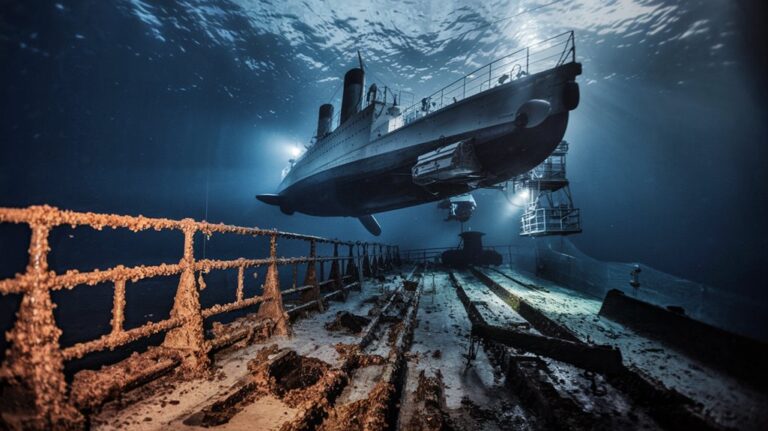Cold War Toilets: A Strange Leak of Secrets
You've probably heard countless tales of Cold War espionage involving high-tech gadgets and dangerous covert missions. But one of the most successful intelligence operations relied on something far more mundane: toilet paper. When Soviet troops faced a severe shortage of this basic necessity, they turned to classified documents as an alternative. This desperate solution created an unexpected intelligence goldmine for Western agents, who discovered that sometimes the best secrets don't need to be stolen—they're simply discarded.
From Latrine to Intelligence Gold: Operation Tamarisk Revealed

During the Cold War, one of the most unusual intelligence operations emerged when Western powers discovered that Soviet troops routinely burned classified documents but left used toilet paper intact.
Operation Tamarisk marked a surprising intelligence evolution, as U.S., British, and French agents sifted through Soviet military waste in East Germany. Like the Cambridge Five network, this operation demonstrated how seemingly unlikely sources could provide critical intelligence insights.
You might be amazed to learn how these covert operations transformed mundane garbage into valuable intelligence. Agents collected everything from discarded letters to hospital waste, uncovering vital information about Soviet military capabilities, troop movements, and technical innovations. These brave operatives faced serious consequences if caught while carrying out their risky missions.
The operation's success proved that even the most unconventional methods could yield significant results. While traditional espionage focused on intercepting communications or recruiting informants, Operation Tamarisk showed that essential insights could come from what the enemy left behind.
The Soviet Paper Crisis: When Documents Became Toilet Paper
While the West enjoyed basic amenities, the Soviet Union faced a peculiar crisis that exposed both its economic failures and security vulnerabilities – a severe toilet paper shortage.
You'd be surprised to learn that the USSR didn't even have a toilet paper factory until 1969, forcing citizens to use newspapers instead. Writing habits and processes were deeply impacted as newspapers meant for reading and information became a scarce commodity due to their alternative use.
The Soviet shortage created an unexpected security breach when soldiers began using classified documents as makeshift toilet paper. Military intelligence, deployment orders, and cipher documents ended up in latrines, compromising sensitive information. British spies like Major Jim Orr conducted dawn missions to gather this intelligence.
The crisis highlighted how the Soviet system prioritized military spending over basic consumer needs.
You can imagine the irony: a superpower that could build nuclear weapons couldn't provide basic hygiene products, leading to long queues and unequal distribution that contradicted communist ideals of equality.
Dirty Work: How Spies Gathered Intel From Waste
As intelligence agencies raced to gain advantages during the Cold War, they turned to an unconventional yet revealing source of information: human waste and garbage.
You might be surprised to learn that scatological analysis became a serious intelligence tool. The Soviets built special toilets to collect Mao's waste during his Moscow visit, while the CIA and MI6 sought Gorbachev's samples before his U.S. trip. The Line X program became notorious for stealing Western technology through any means necessary.
Even French spies tapped into hotel plumbing to gather Brezhnev's urine in Copenhagen.
Operation Tamarisk exemplified this unconventional espionage, with Western agents sifting through Soviet troops' discarded materials in East Germany. They'd collect everything from used toilet paper to hospital waste, revealing essential details about military tactics and soldier injuries.
Beyond waste, spies got creative – using sticky-soled shoes to gather factory samples and giant claws to retrieve sunken submarines. This tradition of waste analysis continues today, as demonstrated by North Korean leader Kim Jong-un who travels with a personal luxury toilet to prevent foreign intelligence from analyzing his health through stool samples.
Uncovering Military Secrets One Sheet at a Time
The most revealing military intelligence of the Cold War often came from the most unlikely source: used toilet paper.
In a remarkable display of intelligence innovation, Western spies discovered that Soviet troops frequently used classified documents as toilet paper due to shortages. Through meticulous waste analysis, agents uncovered military manuals, technical diagrams, and essential operational details that had literally been thrown away. Operation Tamarisk agents also inspected military drill sites and cemeteries for additional intelligence.
You'd be surprised how much these discarded papers revealed about Soviet military movements and capabilities. The operation was similar to how classified defense work in Southern California required absolute secrecy from over 250,000 employees.
While sifting through refuse wasn't glamorous, it provided invaluable insights that couldn't be obtained through conventional methods. The operation proved so successful that it influenced future intelligence gathering techniques, demonstrating how even the most mundane items could yield vital information when examined carefully.
It's a reflection of how creative thinking can transform trash into intelligence treasure.
The Lasting Impact of Operation Tamarisk's Unconventional Methods

Operation Tamarisk's unconventional methods revolutionized intelligence gathering far beyond its original scope.
You'll find its influence reflected in modern intelligence evolution, where agencies now recognize the value of seemingly insignificant information sources.
These unconventional strategies didn't just change how intelligence was collected – they transformed the entire field's mindset. The dedicated agents who sifted through Soviet military waste demonstrated extraordinary commitment to gathering critical intelligence. During the height of tensions, the Lubyanka prison became a chilling symbol of the consequences faced by those caught spying.
You can see Tamarisk's legacy in today's emphasis on creative problem-solving and cross-agency collaboration. The operation's success proved that thinking outside traditional boundaries could yield remarkable results.
The ripple effects extended into ethical and legal frameworks too.
You're witnessing its impact in current debates about privacy rights and intelligence oversight. The operation's methods forced intelligence communities to redefine acceptable practices, ultimately shaping how modern agencies balance effectiveness with ethical considerations.










